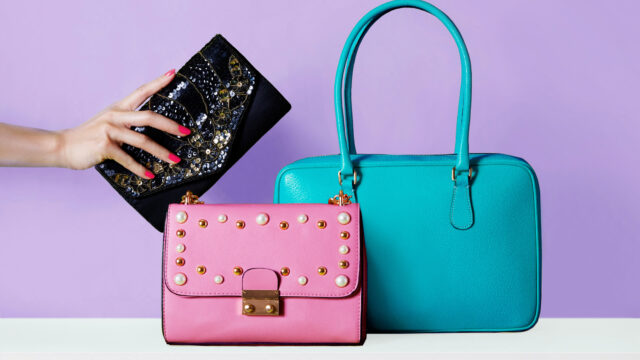- Luxury items are being counterfeited to such a high degree of quality that they have been dubbed “superfakes”
- YPB has a suite of anti-counterfeiting products to secure packaging and provide product tracking and tracing systems
- Bluechiip is protecting the integrity of biospecimens and samples with its MEMS-based wireless tracking solution
In a world where counterfeit designer products flood the market, consumers are often left wondering how to distinguish genuine luxury goods from their counterfeit counterparts.
Spotting a fake designer item can be challenging due to the increasingly sophisticated replication techniques employed by counterfeiters.
Counterfeit is big business. The progress of technology, including 3D printing and AI, has emboldened counterfeiting operations, causing significant harm to brands across various sectors through the proliferation of counterfeit goods and deceptive consumer interactions.
Gone are the days when spotting a fake was as simple as a glaring typo like “Louis Vuittong”, an incorrect font choice or poor-quality materials.
Luxury items can be counterfeited to such a high degree of quality that the differences can be imperceptible to the human eye in what has been dubbed “superfakes” or “clones”.
Furthermore, there are cases where people are paying the luxury good price but reportedly getting a superfake.
One high profile case playing out now revolves around Sydney luxury boutique Cosette with hundreds of customers reportedly putting in complaints to NSW Fair Trading about handbags they have allegedly been sold that are actually fakes.
But Cosette, which has had a string of influencers parading their gear on social media, is disputing claims, saying all goods sold are genuine.
The problem of counterfeiting has become deeply ingrained into the global supply chain.
As it continues to grow both businesses and governments are poised to ramp up their investments in anti-counterfeiting solutions to safeguard brands and maintain the integrity of products.
MarketsandMarkets forecast the authentication and brand protection market to reach US$4.3 billion by 2028 from US$2.9 billion in 2023, at a CAGR of 8.3% during 2023-2028.
According to the International Trademark Association global sales of counterfeits are growing at 15% each year and reached more than US$1.82 trillion in 2020.
And while we think of luxury goods such as handbags and clothing, counterfeit is affecting many industries including pharmaceuticals, electronic equipment, and parts.
Furthermore, food and medical companies are also working to protect the integrity of their products and samples to ensure there is no confusion around origins, who they belong to or even whether they have been stored at optimal temperatures.
These ASX companies are playing cat and mouse in a bid to protect brands from fakes and ensure the integrity of food products and medical specimens.
YPB develops and sells authentication solutions which protect brands and vital documents whilst triggering engagement between brands and their consumers.
It’s proprietary physical, digital, and AI-based solutions can easily authenticate FMCG products, ID documents, pharmaceuticals, and more.
The company was founded in 2011 and listed on the ASX in 2014 and is striving for growth in expanding markets, leveraging AI and digitisation.
Founder, chairman and CEO John Houston told Stockhead he saw that the world was changing, with more products being produced for a global market.
“I knew that the global counterfeiting industry was going to grow exponentially and one of the solutions to this problem was mass serialisation of individual products which is now possible due to the emergence of the QR code during Covid,” he says.
Counterfeit was a problem Houston knew he had the tools to solve and could share with businesses and governments globally.
YPB has sales, marketing and development operations in Thailand, China, and Australia.
It’s anti-counterfeit and consumer engagement products have been used across various sectors, including well-known clothing labels, electrical goods, FMCG products to name a few.
“Our products have been used to protect and engage users on over a billion units worldwide, and we continue to innovate to ensure our customers can access cutting-edge security solutions,” Houston says.
“We have an amazing portfolio of patents and IP and recently embarked into Artificial Intelligence (AI) through a licensing deal with Nviso based in Switzerland.”
In 2019 YPB signed a contract with the world’s largest shirt producer Esquel to adopt YPB’s invisible thread technology to protect against copies in the supply chain.
YPB’s invisible tracer technology is currently being rolled out for the first time in the US to address pull tab/instant lottery ticket fraud under a three-year Master Services Agreement (MSA) with Smart-tab Systems LLC.
Copying and double redemption is an increasingly significant problem for pull tab/instant lotteries generally, and the company’s tracer will prevent the copying and fraudulent double redemption of winning pull tab/instant lottery tickets.
“We have developed a simple, low-cost solution to a very expensive problem and are confident of its efficacy and relevance,” Houston says.
DTZ’s Dotz Shield is an anti-counterfeiting and monitoring nanotechnology solution using in-product taggants for brand protection, product liability, and in-field testing.
It encompasses in-product tagging, in-field tracing and monitoring, and real time reporting and measurement.
DTZ’s same nano technology is also being used in its Dotz Earth carbon capture solution appealing to a range of sectors, including oil and gas, construction and cement, agriculture, and chemicals.
DTZ CEO Sharon Malka the Dotz Shield solution is in demand from the art security sector and other industries working with inks and print.
He says their main demand for their anti-counterfeit technology is from the oil, gas and chemical sectors.
“Dilution of crude oil results in damages of between 275–800 billion USD every year,” he says.
Malka says losses typically occur between storage and transportation.
“In the chemical space, the Australian lubricant market accounts for 40% of the entire global industry.
“In APAC, it is estimated that 10-20% of sold lubricants are counterfeited.
“There is clearly a growing need for anticounterfeiting solutions and our proprietary nanotechnology ensures Dotz Nano is well placed to meet these needs.”
Malka says while its anti-counterfeiting anti-counterfeiting solutions continue to be in demand, its work with industrial emitters led to the acquisition of the Dotz Earth technology this year.
“This proprietary, patented technology utilises plastic waste to capture and store CO2, addressing a US$600 billion market need by 2050,” he says.
“It is a strategic acquisition for the Dotz Nano business and complements our current work with the oil and gas, chemical, and construction sectors.
“Pleasingly, we are seeing significant interest from target industries and investors for the Dotz Earth technology, which is presenting the strongest global growth opportunity for the Dotz Nano business.”
While not so much counterfeit, what about protection of specimens and samples in the biotech sector? Melbourne-based BCT is the developer of a wifi-enabled, durable tagging system for bio-specimens, working to preserve their integrity.
The BCT device is a sensor embedded into bags or vials, recording the details (and temperature) of the specimens.
BCT says the MEMS-based wireless tracking solution contains no electronics and represents a generational change from current tracking methods such as labels (handwritten and pre-printed), barcodes (linear and 2D), and Radio Frequency Identification.
BCT tags are either embedded or manufactured into storage products such as vials or bags.
Each product is easily identified and critical information, such as sample temperature, detected by readers and stored in the BCT software.
In addition to functioning in extreme temperatures, the Bluechiip Advanced Sample management solution can survive autoclaving, gamma irradiation sterilisation, humidification, centrifuging, cryogenic storage, and frosting.
BCT’s key target markets are IVF and assisted reproductive technologies, clinical trials, cell therapies, bio-banking, and vaccine development, where samples can be stored at -196 degrees C.
Other opportunities beckon for BCT in the cold-chain logistics sector including food, drink, and other consumer goods.
BCT says one challenge in this sector is knowing whether an item has been stored at above optimal temperature for any length of time.
The YPB, DTZ, BCT share price today:
At Stockhead, we tell it like it is. While YPB Group is a Stockhead advertiser, it did not sponsor this article.
You might be interested in












